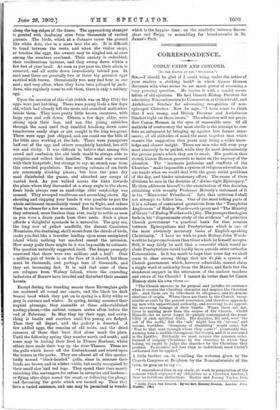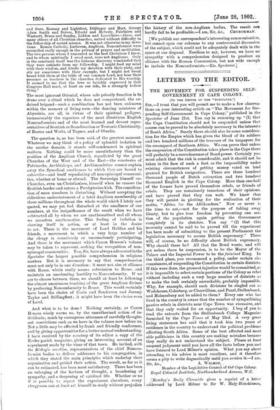CORRESPONDENCE.
GODLY UNION AND CONCORD.
[To THE EDITOR OP THE " SPECTATOR." I
Sia,—I should be glad if I could bring under the notice of your readers a striking book* in which Canon Henson 'discusses with what seems to me much power of reasoning a very pressing question. He begins it with a candid recan- tation of old opinions. He had blamed Bishop Perowne for admitting Nonconformists to Communion at Grindelwald, and Archdeacon Sinclair for advocating recognition of non- episcopal Churches. Now he says : " I have come to think that I was wrong, and Bishop Perowne and Archdeacon Sinclair right on those issues." The admission will not preju- dice Canon Henson in the eyes of reasonable men. Of all methods of controversy the most sterile is the attempt to con- fute an antagonist by bringing up against him former utter- ances; of all attitudes of mind the most hopeless that which resents the suggestion that years may bring a wider know- ledge and clearer insight. There are men who will even pray most sincerely to be guided, while they fix most determinately the precise points which they are to reach. His position thus stated, Canon Henson proceeds to insist on the urgency of the situation. The " insensate jealousies and conflicts of the Churches " make impossible a system of religious education, tie our hands when we would deal with the great social problems of the day, and hinder missionary effort. The cause of these divisions he sees in the doctrine of " divine-right Episcopacy." He then addresses himself to the examination of this doctrine, criticising with severity Professor Moberly's statement of it in his " Ministerial Priesthood." Into that criticism I shall not attempt to follow him. One of the most telling parts of it is a column of contrasted quotations from the " Theophilus Anglicauus" of Bishop Wordsworth (Fere) and "The Ministry of Grace" of Bishop Wordsworth (ids). The younger theologian finds in his " dispassionate study of the evidence " of primitive Church government " a practical basis for that reunion between Episcopalians and Presbyterians which is one of the most obviously necessary tasks of English-speaking Christianity." I have no wish to push Bishop John Words- worth to largerconclusions than those which he himself accepts. Still, it may fairly be said that a concordat which would in- clude Presbyterians would hardly leave outside other orthodox Communions. Is it too much to hope that some day we shall cease to class among things that are de fide a system of Church government which, however admirable, cannot claim a single word of authority from the Master, and finds but the slenderest support in the utterances of the earliest teachers and rulers of the Church P I cannot do better than let Canon Henson state his own views :— "The Church answers to its purpose and justifies its existence when it creates the Christian character and inspires the Christian life. And these are its title-deeds to allegiance, and its demon- strations of origin. Where these are there is the Church, recog- nizable as such by the general conscience, and therefore approach- ing men with unquestioned authority, and receiving to its appeals the answering homage of their hearts. Where these are not, there is nothing more than the corpse of the Church. Christ Himself—let us never forget it—plainly contemplated the possi- bility of such spiritual death. His disciples, He said, were the salt of the earth,' but the 'salt' might lose its 'savour,' and become worthless. 'Occasions of stumbling' would come, but Woe to that man through whom they came ' Constantly this warning note is audible throughout the Gospel, and it is sustained in the Epistles. Evidently we must reverse the common order. Instead of judging Christians by the churches to which they belong, we ought to judge the churches by the Christians they produce. To societies not less than to individuals must Christ's authorized test be applied."
A little further on, in recalling the welcome given to the Church Congress at Brighton by the Nonconformists of the town, he goes on to say:—
"I remembered that in my study, at work in preparation of the sermons which expressed my obligation as a Christian teacher, I drew no invidious distinctions. Baxter and Jeremy Taylor, Dale
• Godly Union and Concord. By the Be,. Heasley HOU11032. London: John Murray. N.]
and Gore, Ramsay and Lightfoot, Dellinger and Hort, George Adam Smith and Driver, ilitschl and Moberly, Fairbairn and
Westcott, Bruce and Sanday, Liddon and Lacordaire—these, and many others of all Christian churches, united without difficulty in the fellowship of sacred science. It was not otherwise in my devo- tions. Roman Catholic, Lutheran, Anglican, "Nonconformist were reconciled easily enough in the privacy of prayer and meditation. The two persons whom I venerated as the best Christians I 'mew, and to whom spiritually I owed most, were not Anglicans. Only in the sanctuary itself was the hideous discovery vouchsafed that they were outcasts from my fellowship. I might feed my mind with their wisdom, and kindle my devotion with their piety, and stir my conscience with their example, but I might not break bread with them at the table of our • common Lord, nor bear their presence as teachers in the churches dedicated to His worship. It seemed to me that the loVe so lavishly expressed in that Congress Hall must, at least on our side, be a strangely hollow thing."
The most ignorant Oriental, whose sole priestly function is to
drone over a ritual which he does not comprehend, the or- dained brigand—such a combination has not been unknown
within the memory of living men—the dancing ministers of Abyssinia, are all, in virtue of their spiritual pedigree, immeasurably the superiors of the most illustrious English Nonconformists and of the most learned and devout repre- sentatives of Scottish or Scandinavian or Teutonic Christianity, of Baxter and Watts, of Tegner, and of Oberlin.
The question is, as has been said, of the greatest moment. Whatever we may think of a policy of splendid isolation in the secular domain, it stands self-condemned in spiritual matters. • Nothing could be more unsatisfactory than the position of the Anglican Church, repudiated by the great Churches of the West and of the East—the courtesies of Patriarchs, Archbishops, and Archimandrites cannot explain away the Synodical anathemas to which they are bound to subscribe—and itself repudiating all non-episcopal communi- ties, whether at home or abroad. The Sovereign himself un- Churches, even un-Christianises, himself when he crosses the Scottish border and enters a Presbyterian kirk. The considera- tion 'of mere numbers is disturbing. Without accepting the ridiculous understatement of a total Anglican membership of three millions throughout the whole world which I lately saw
quoted, we may yet feel disturbed at the smallness of our numbers, at the insignificance of the result when we have subtracted all by whom we are anathematised and all whom we ourselves anathematise. This feeling of isolation is showing itself in action, or at least in the desire to act. There is the movement of Lord Halifax and his friends, a movement in which a very large 'number 'of the clergy is consciously or unconsciously participating. And there is the movement which Canon Henson's volume may be taken to represent, seeking the recognition of non- episcopal communities. You, Sir, have always advocated in the Spectator the largest possible comprehension in religious matters But it is necessary to say that comprehension must not only be in one direction : it must not aim at alliance with Rome, which really means submission to Rome, and maintain an unrelenting hostility to Nonconformity. If we are to choose between them, we should at least be following
the almost unanimous teaching of the great Anglican divines by preferring Nonconformity to Rome. This would certainly have been the choice of Cosin and Sanderson and Jeremy Taylor and Stillingfleet ; it might have been the choice even of Laud.
And what is to be done ? Nothing certainly, as Canon Benson wisely warns us, by the unauthorised action of in- dividuals ; much by courageous utterance of carefully thought- out convictions such as we have in the volume now before us. Not i little may be effected by frank and friendly conference, and by giving opportunities for a better mutual understanding. I have received by the courtesy of its editor a copy of the Eccles parish magazine, giving an interesting account of an experiment made by the vicar of that town. He invited, with the Bishop's sanction., -representatives of the chief Noncon-
formist bodies to deliver addresses to his congregation, in which they stated the main principles which underlay their
organisation and guided their action. The result, as far as it can be estimated, has been most satisfactory. There has been an -enlarging of the horizon of thought, a broadening of sympathy, and a deepening of spiritual life. Whether or no it is possible to repeat the experiment elsewhere, every clergyman can at least set himself to study without prejudice [We publish our correspondent's interesting communication, but cannot open our columns to any controversial discussion of the subject, which could not be adequately dealt with in the space at our disposal. Needless to say, however, we have no sympathy with a comprehension designed to produce an alliance with the Roman Communion, but not wide enough to include the Nonconformists.—En. Spectator.]



















































 Previous page
Previous page